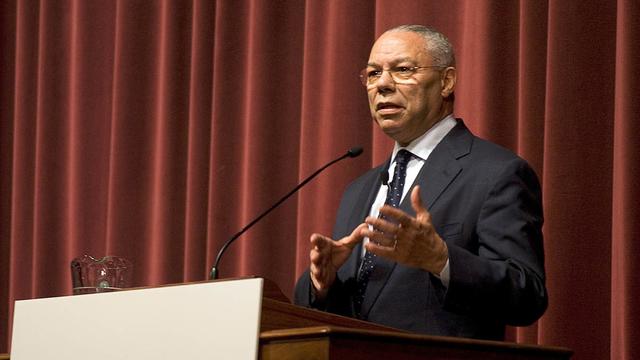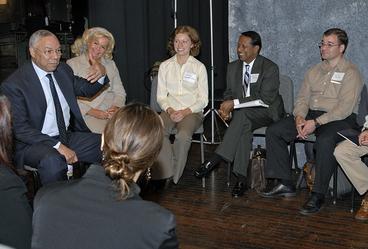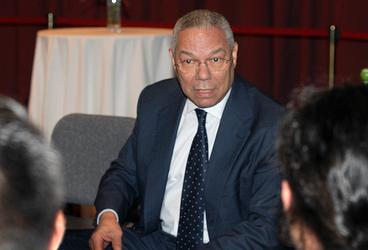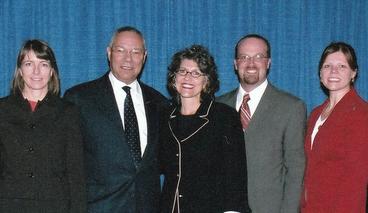Colin Powell, who served as the country’s first Black national security advisor, chairman of the Joint Chiefs of Staff, and secretary of state, died last week at age 84 due to complications from COVID-19. Camille Gage, a former staff member at the Humphrey School of Public Affairs, recalls with great fondness the day Powell spent with the School’s students and staff in October 2006.
---
The giant black SUV rolled slowly to a stop. Before the driver could round the car to open the door chauffeur-style, Colin Powell popped out from behind the tinted windows. “Good morning Secretary Powell!” I said as I extended my hand for a shake.
Powell replied with a smile. “You must be Camille. Good to meet you. Got a Diet Coke for me?”
By then I had some experience in my job staffing dignitaries for the Humphrey School of Public Affairs, and I could already tell he was going to be easy — no diva, no drama.
Powell delivered the Distinguished Carlson Lecture at the Humphrey School on Oct. 4, 2006. His speech centered on the war in Iraq and the eventual withdrawal of American troops after lengthy conflicts – foreshadowing a contentious news story some 15 years later.
In a speech covered by both local and national press, Powell stated that the U.S. and its allies could not resolve the violence in Iraq. “Only the Iraqi people can resolve this,” he said, and though U.S. troops would have to stay in Iraq for “some time … staying the course isn’t good enough because a course has to have an end.”
Powell’s assessment was especially bracing given his own role helping sell the war to the American public and the world during a now infamous presentation at the United Nations about Saddam Hussein’s supposed weapons stockpile, which turned out not to exist. He acknowledged as early as 2005 that the moment would permanently scar his record.
He gave a sobering, prescient foreign policy address, but what I remember most about him was his playfulness, easy charm and self-deprecating sense of humor.
'In his element' with students
Powell had agreed to meet for an informal roundtable with a group of public policy students before his speech. As we waited for them to arrive, he flew back and forth across the Northrop stage on his knee scooter. He had blown out his Achilles tendon the week before and was under strict orders to put no weight on the injured leg. “I gotta learn how to use this thing!” he laughed as he sailed across the stage, happy as a kid on a new bike.
When the students arrived it was clear he was in his element. Powell was a natural storyteller. He loved sharing the tale of his unlikely personal trajectory from a kid born in Harlem and raised in the Bronx to a man who could claim three “firsts”: first Black national security advisor, chairman of the Joint Chiefs of Staff and secretary of state. He told his story humbly, with humor, and as an inspiration for others.
Powell shared that he was a listless student and did poorly in college, barely making a “C” average.
“City College of New York couldn’t wait to get rid of me back then,” he laughed, “and now they can’t wait to have me back! Especially when they need to raise some money!”
With dismal grades, Powell told the students he knew his career path was not to be found in business or academics, and he decided to join the Reserve Officer Training Corps.
He later enlisted in the Army, did two tours in Vietnam and began his storied move up the ranks. He believed the military provided advancement opportunities for a working class Black man in the 1960’s, and that hunch — and hard work — would serve him well.
Stories from his travels
Powell’s best story came from his time as secretary of state. In 2001 Powell and his team attended a two-day summit with Asia-Pacific foreign ministers in Vietnam. It was a tradition to have a talent show on the final night of the annual event. No media.
Powell was paired with Makiko Tanaka, the Japanese foreign minister, and convinced her to perform Marty Robbins' No. 1 hit song, “El Paso,” which had special meaning for him. The song, about a cowboy’s unrequited love for a dance hall girl named Feleena, was sung by Powell, while Tanaka, her face partially hidden by a Vietnamese hat, played the love interest.
Everything went according to plan until the very end, when Powell slumped to the floor. Instead of simply running to him for a chaste embrace, Minister Tanaka gave Powell’s dying cowboy a kiss. You can imagine Powell’s shock; a kiss, even acted, would be wildly out of character for a Japanese leader. Dignitaries representing the Japanese government are expected to adhere to strict protocols dictating personal interaction and decorum.
Powell told the students that as he lay on the stage floor, getting kissed by Tanaka, he lifted his head imperceptibly and surveyed the crowd.
“I thought we were going to cause an international incident!” he said with a grin. But their contemporaries loved it, and only a few uptight eyebrows were raised.
Respect for professionals and staff
Powell’s hour with the students flew by, answering serious policy questions and sharing personal anecdotes. Soon the VIPs who were part of the lecture program began arriving and were starstruck. They circled around Powell and waited for him to call the shots.
“Where should we go, General?” one finally asked. I stood on the edge of the circle, all but invisible, amused. Powell shot me a knowing look and said, “I’m sure Camille knows exactly what you all should do.” I high-fived him in my heart.
Respect for both the professionals and everyday staff — the people behind the scenes who make it all happen — was a hallmark of Powell’s career.
Brian Atwood, former dean of Humphrey School and head of the U.S. Agency for International Development during the Clinton administration, told me, “Colin Powell was a man who was comfortable in his own skin. Everyone at the State Department loved him because he always respected the analysts and staff.”
Atwood relayed that when Powell went to the White House for his first briefing for President George W. Bush — a prestigious moment for a new secretary of state — Powell turned to the staffers and let them lead the briefing.
Atwood said that word spread quickly through the State Department: “International affairs professionals were thrilled to have a secretary that respected their expertise.”
A few weeks after the lecture, I received a personal note from Powell thanking me for my work that day. If memory serves, it was the only personal thank you note I received during 13 years of staffing dignitaries there. Few are the VIPs who remember — let alone thank — a mere staffer like me.
Colin Powell was the quintessential public servant and gentleman, and it was both an honor and pure pleasure to spend a day with him.
---
Camille Gage is a Minneapolis-based writer and artist. She was the Humphrey School's events manager from 2000 to 2012. Her piece was originally published by the Minnesota Reformer.





